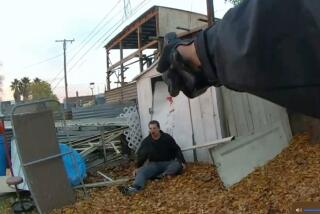Family’s Cadaver Lawsuit Is Settled
- Share via
Rather than go to trial, the University of California and a contractor have agreed to pay $630,000 to settle a lawsuit alleging that UC Irvine illicitly sold a spine from a donated cadaver and lost the rest of the remains.
The case, which was scheduled for trial next week, would have been the first to go before a jury in the well-publicized failure of UCI’s Willed Body Program in the late 1990s. At least four cases already have been settled, some have been dismissed, and several more are still pending.
By some lawyers’ estimates, the problems have led to as many as 40 claims in a dozen lawsuits, including 20 filed as part of a class-action lawsuit.
At a settlement conference Friday, the parties reached an agreement that still must be approved by the UC Board of Regents. Under it, UC would pay $455,000 and Jeffrey Frazier, a contractor who handled donation forms, billing and transporting bodies for UCI, would pay $175,000.
After repeated complaints in 1999, UCI began an investigation of the program that concluded that of 441 cadavers donated over a period of years, 320 could not be identified or tracked. Christopher Brown, the program’s director, was fired after investigators concluded that he had sold cadaver parts, misappropriated funds and conducted unauthorized autopsies. Brown was not charged with any crime.
UCI later adopted strict guidelines governing the use of remains donated for research.
Joseph Coghill, 78, died in 1999 of pulmonary fibrosis. At his request, his family donated his body for research to UCI. Told it would be used for an anatomy class at UCI School of Medicine, they became suspicious when unused remains, purportedly Coghill’s, were returned to the family after just three months instead of the expected one to three years.
The family later learned that Coghill’s body had been cremated one week after director Brown sold seven spines to a research facility in Arizona. Though cremated remains were sent to one of Coghill’s sons, a forensics expert retained by the family concluded that they were not Coghill’s.
Lawyers for the family were prepared to introduce evidence that X-rays of one of the spines sold to the Arizona facility matched an X-ray of Coghill’s spine. Family members say they have never received his remains.
“Everyone considers [the case] resolved, but I don’t have any closure,” said Joseph Allen “Skip” Coghill, one of Coghill’s sons. “I still don’t have my father’s remains back.”
Lou Marlin, a lawyer retained by the University of California, said the university was “happy to resolve the matter.”
Many of the cases have been dismissed because the donors did not specify that their remains be returned to their families. Without that request, legal experts say, families have little basis on which to to make legal claims. The Coghill family’s case was bolstered by a written contract specifying that the remains be returned.
“All of this could have been avoided if the leadership had ensured the institution was operating under the highest bioethical and professional standards,” said David L. Belz, a lawyer for the Coghill family. “They failed miserably.”
More to Read
Sign up for Essential California
The most important California stories and recommendations in your inbox every morning.
You may occasionally receive promotional content from the Los Angeles Times.












